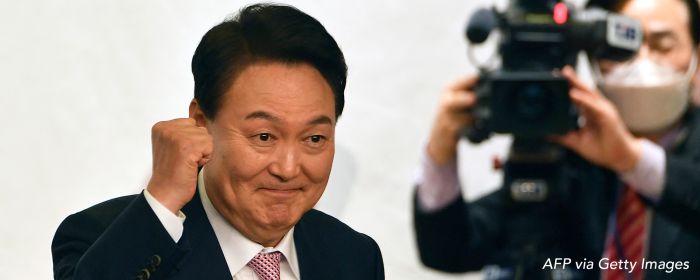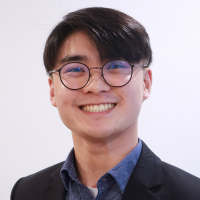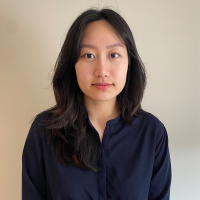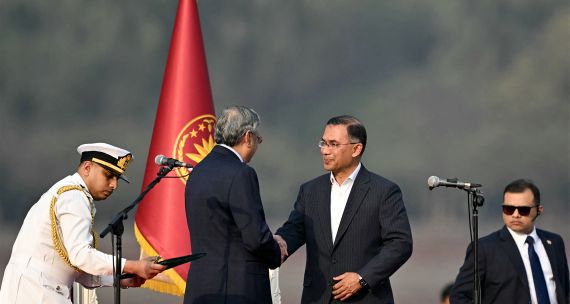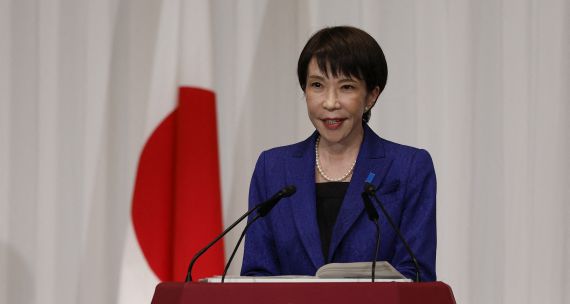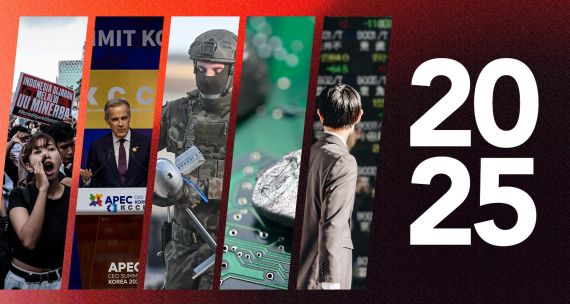This Dispatch is the sixth in a six-part series by our South Korea Election Watch, a team of young analysts tracking key developments and issues in South Korea’s March 9 presidential election. The series spotlights a segment of the population that most observers believe will play a decisive role in the outcome of the election: voters in their twenties and thirties. It looks at how they view their options in terms of the candidates and main political parties; how they might be impacted by the next administration’s economic policies; how the candidates are trying (or not) to appeal simultaneously to both young feminists and ‘anti-feminists’; their generation’s diverging views on inter-Korean relations; and how the ‘China factor’ has become more complex for them than for their parents and grandparents.
Main Image: South Korea's President-elect Yoon Suk-yeol gestures during a ceremony disbanding the presidential election camp at the National Assembly Library in Seoul on March 10, 2022. Photo: Song Kyung-Seok/Pool/AFP via Getty Images
It was a close one. On March 9, after a long night of ballot counting and (occasionally bizarre) broadcast animations, the election of South Korea’s 13th president came to rest on a knife’s edge. In the end, Yoon Suk-yeol of the conservative People Power Party (PPP) pulled off a win over Lee Jae-myung of the liberal Democratic Party by a mere 0.73 per cent of the vote, the closest ever for a South Korean presidential election.
The election was widely described by South Koreans as a kind of race to the bottom between the two ‘most unfavourable’ candidates, with mudslinging, family scandals, and inflammatory rhetoric infusing the public atmosphere. But despite all the negativity, voter turnout reached a near-historic high (77%), the defeated candidate offered a prompt concession speech, and the public readily accepted the result despite the microscopically small margin by which Yoon clinched victory.
These immediate post-election actions underscore that South Koreans respect fundamental democratic norms and support a peaceful transition of power. But Yoon’s election afterglow seems to have faded rather quickly. When he assumes office on May 10, he will face the challenges of governing a highly polarized electorate, need to be ready to respond to an alarming set of provocations by North Korea, and have to calm the public’s apprehensions about his competence and ability to be a steady hand guiding the country through the next five years.
Governing across political fault lines
In some respects, the March 9 election marked a departure from the norm in that Yoon and Lee were both unconventional candidates who did not follow a typical path to seeking the country’s highest office. In other respects, however, it was a reversion to the mean of regionalism being a strong determinant of voter preferences. Yoon held a commanding lead in the southeast, a traditional conservative stronghold, while Lee dominated in the southwest, a longstanding support base for the country’s left-leaning candidates. In some localities, particularly in the southeastern region of Gyeongnam and the southwestern region of Honam, Yoon and Lee led by more than 70 per cent in these respective strongholds. The exceptions included Gangwon Province in the northeast and North and South Chungcheong Provinces in the centre and west. Yoon’s camp managed to flip these regions after they were carried by the progressive incumbent, Moon Jae-in, in the 2017 election.
But while regional divides are familiar political terrain for South Korean presidents, Yoon will be presiding over a fresher and more raw fault line on issues related to gender, specifically, the anti-feminist backlash that was a defining issue in last month’s election.
As discussed in a previous Dispatch, while both Yoon and Lee courted the votes of young, male anti-feminists, Yoon was more unbridled in his pandering to this group. The question now is whether Yoon’s rhetoric was merely for short-term political expediency – picking up votes in a tight race – or whether the attitudes underlying this rhetoric signal a longer-term political strategy for sustaining popular support.
On the one hand, the exit polls tell an interesting story about the gender divide, especially among young South Koreans: 59 per cent of young men in their twenties supported Yoon, and 58 per cent of young women in the same age group supported Lee. Similar, though less pronounced, patterns were observed among men and women in their thirties. On the other hand, it can be difficult, if not impossible, to divine the real reasons people vote the way they do. Among young South Koreans in particular, the gender issue can be tightly intertwined with economic precarity, a hot-button issue in a country experiencing growing inequality, high youth unemployment, and acute housing unaffordability. Young men who embrace anti-feminism tend to do so because they feel feminism is to blame for their lack of economic opportunities, which they attribute to ‘reverse discrimination’ against them. But some analysts say it is unclear whether they voted for Yoon because they fundamentally agreed with his anti-feminist rhetoric, or for other reasons, such as the real estate scandals that have tainted Moon’s presidency. According to exit polls, both men and women seem to have prioritized voting based on who they believed would improve their economic standing rather than on gender issues.
But this potential ambiguity about where young South Koreans, in particular, stand on gender issues does not seem to have encouraged Yoon to moderate his earlier positions. He remains intent on following through on his promise to abolish the Ministry of Gender Equality and Family (MOGEF), and his team has not created any subcommittee to look at issues related to gender. (Abolishing the MOGEF may be complicated by the fact that the Democratic Party will hold onto its majority in the legislature.) In addition, Yoon’s transition team is made up predominantly of men in their fifties and sixties who graduated from the prestigious Seoul National University. This marks a visible departure from the gender and regional balance struck by the outgoing Moon administration.
Many women and advocates are concerned that anti-feminism is becoming normalized, especially since it has been embraced by the country’s next leader. They fear that this normalization is facilitating an environment that is unsafe for feminist activism. They are not alone: civil society representatives and some lawmakers have also expressed their worries about the widening polarization around issues related to gender. Assuming this polarization persists, important conversations about gender in South Korean society, such as workplace discrimination, sexual harassment, and inequality within the family, may be pushed aside at a time when they are needed more than ever.
There goes the neighbourhood
If Yoon was hoping to get a little breathing room on foreign and inter-Korean policy, he is already disappointed. On March 24, it was reported that North Korea had tested an intercontinental ballistic missile (ICMB) more powerful than the last one it tested in 2017, and capable of reaching the U.S. mainland. A week later, evidence surfaced that the missile may have been a fake – an older ICBM disguised as a more advanced version, likely launched to create the impression of military strength for domestic audiences. Nevertheless, the test violated UN resolutions and still represented technological progress in its weapons development. Some observers now worry that another nuclear test could be next on Pyongyang’s list.
During the campaign, Yoon criticized Moon Jae-in’s engagement-oriented approach to North Korea, vowing to take a tougher stance against Pyongyang and collaborate closely with the U.S. But Yoon’s foreign policy and national security teams will have to take a rapid and astute measure of how much the world has changed in the past month. Whereas Washington was able to get China and Russia to agree to UN sanctions on Pyongyang for the 2017 missile test, the extreme diplomatic fallout over Russia’s invasion of Ukraine will make similar compliance among these two Permanent Five Security Council members all but impossible.
On the day of the missile test, Yoon got a taste of the reality of managing national security in a very tense neighbourhood. In a March 25 call with Chinese President Xi Jinping, Yoon implored Beijing to "cooperate closely [with South Korea] to achieve permanent denuclearization of North Korea and stable management of political conditions on the Korean Peninsula.” The recognition of the need for China’s help demonstrates the gap that can exist between campaign talk and presidential action. Yoon’s less-than-friendly approach to China as a candidate resonated with the steady rise in anti-Chinese sentiment among the South Korean public, despite the country’s close economic relationship with its much larger neighbour.
It is not yet clear how responsive Xi will be to Yoon’s outreach. On the Chinese side, Xi Jinping is believed to want to improve relations with South Korea to bolster his foreign policy bona fides as he seeks an unprecedented third term at a party congress – a major event in Chinese politics – later this year. But Beijing clearly stated its concerns over Yoon’s plans to strengthen Seoul’s relationship with the U.S., as well as his statements about an upgrade of the Terminal High Altitude Area Defense (THAAD) system, first deployed in 2017 in response to North Korean missile provocations.
After the initial THAAD deployment, the Chinese government and Chinese public were unsparing in their negative reaction, punishing South Korean companies and boycotting South Korean-made products. Although the issue reportedly did not come up in the March 25 Xi-Yoon phone call, Beijing has argued that the system’s powerful radar can penetrate its territory, and thus we should expect this to be a sticking point in the bilateral relationship.
The 0.73 per cent president?
While South Korea is by no means an isolated case of presidential elections being decided by thin margins, a whisker-thin 0.73 per cent hardly gives Yoon a robust mandate out of the gate, especially since he garnered less than 50 per cent of the total vote share. Exit polls similarly indicated that less than half of voters felt the need for a change of government.
With or without a broad public backing, as noted above, Yoon will bear the Sisyphean task of uniting a highly divided electorate. There are already some warning signs, or at least unresolved questions, as to whether doing so is even a priority for him.
One such question is whether Yoon will seek political revenge over his former boss, outgoing president Moon Jae-in. South Korean politics is rife with recrimination: The last three presidents – Roh Moo-hyun, Lee Myung-bak, and Park Geun-hye – all ended up in prison for corruption and abuse of power, usually after their political rivals assumed the presidential office.
Will Yoon, the former Prosecutor General who played a key role in convicting former president Lee and Park, be the one to end this cycle? The evidence does not suggest reasons for optimism: Asked a month before the election if he would probe the Moon administration if he were to emerge the victor, Yoon stated, “Of course there will be an investigation.” Whether he follows through with this promise will be seen in the coming months. Still, even if he is inclined to do so, he may be hamstrung initially by needing to work with Moon’s party in parliament to confirm his cabinet appointments and pass his budgets. However, according to one observer, if regional elections in June and legislative elections in 2024 swing in the conservatives’ directions, there will be greater momentum to launch investigations into political rivals. This includes Lee Jae-myung, whom conservatives will continue to view as a viable threat.
Finally, Yoon has stirred up controversy over his plans to relocate the presidential office from the Blue House, as the presidential residence is known, to a defence ministry building in Seoul, ostensibly to be ‘closer to the people.’ The plan has been slammed by critics who say it will be costly and unfeasible due to national security concerns and the proposed new site’s location amid heavy traffic jams. Yoon’s vows to press ahead with these issues have re-surfaced concerns about his competency and fitness for office – concerns that dogged him as a candidate.
All that said, successful presidencies have been carved out of similarly small electoral mandates, and Yoon may end up surprising his detractors by doing the same. But he will have his work cut out for him both domestically and internationally as he assumes office on May 10.
About the South Korea Election Watch (SKEW):
The SKEW is part of APF Canada’s election watch series, first launched in 2016, of graduate and undergraduate students and young professionals working with APF Canada to monitor and analyze key national-level elections in the Asia Pacific, including their implications and the underlying social, economic, and political issues.
Other Dispatches in this Election Watch Series:
The ‘China Factor’ Looms Large Over South Korean Presidential Candidates’ Foreign Policy Choices - Lina Park
Places, Parties, and Politicians: A Primer on South Korea’s 2022 Presidential Election – Daniel Jacinto
South Korea’s Presidential Candidates Seek Solutions to Persistent Economic Problems – Kevin Seo
South Korea’s Presidential Contenders Court Young, Male Anti-Feminists – Lynn Lee
South Korea’s Presidential Candidates Formulate North Korea Policies Amid Shifting Public Opinion – Chloe Kang
